Julie and I went for a walk and saw this house around the corner. It looks nice.

Julie and I went for a walk and saw this house around the corner. It looks nice.

This Guy Noticed Jigsaw Puzzle Companies Use The Same Patterns, So He Made Some Mashups.
“Jigsaw puzzle companies tend to use the same cut patterns for multiple puzzles. This makes the pieces interchangeable. As a result, I sometimes find that I can combine portions from two or more puzzles to make a surreal picture that the publisher never imagined.”
Jacobin: A Marxist View of Tolkien’s Middle Earth
J. R. R. Tolkien’s fantasy world is a medieval utopia with poverty and oppression airbrushed out of the picture. But Tolkien’s work also contains a romantic critique of industrial capitalism that is an important part of its vast popular appeal.
Also: race, gender, and sex in Middle Earth.
Good morning. Here are your daily ducks.
That strange quality of light you’re seeing in this photo is called “sunshine.” We have not seen it here in a while. True fact: San Diego was once famous for it!

Everywhere on Earth, from Europe to China to Africa to Australia and the Americas, is dominated by Europe or its legacy.
The whole world is either Europe, a European colony, or conquered by Europe or the US (a European colony).
That’s all coming to an end now, says Ian Welsh.
And it’s happening so fast we can see it.
The Death Throes Of The World Europe Made:
[Conflict with China] is about whether a non-European power will be allowed to remake the world Europe made. … It is an existential threat to European rule, and it is being treated as such. The “yellow peril” has arrived.
In 30 years, will Mandarin be the the new English? The new lingua-Franca? The language everyone has to know and that you can, if clumsily, get by on almost everywhere?
Absent a major war, likely nuclear, or civilization collapse, I find it hard to see a scenario where China doesn’t become the most important global power.
In Santee, which is a few miles from where we live, 17-year-old Rebecca Philips says she saw a naked “adult male” in the local YMCA dressing room. The naked person was reportedly a transgender woman. Philips later appeared on Tucker Carlson, the story got picked up by the New York Post and Gateway Pundit, and now a local right-wing wannabe-demagogue is claiming Antifa is going to target the community for violence and their people will “send them [effing] packing.” And the Y is closing early for fear everything will blow up.
Can everybody just chill here? And not go on Tucker Carlson or get ready to send people [effing] packing?
Santee YMCA Closing Early, Fearing Rally Clashes Over Teen’s Report, Trans Rights (Times of San Diego/Ken Stone)
Instagram video: British comedian loves Fahrenheit.
Fahrenheit is the best. Celsius is for losers.
Is Micromanaging Your Life With an App Really a Good Idea?. I’ll add a reminder to myself to look into that.
Good morning. Here are your daily ducks.

An unofficial list of the most influential science fiction works ever. The science fiction that strongly influenced real life spaceflight pioneers. By Eric Adelson at the Washington Post.
“I’m a man who appreciates it when food dares you to eat it.”
I am quite enjoying the AwkwardSD newsletter, from fellow San Diegan Ryan Bradford, who shares a review of a spaghetti dinner from By The Bucket, a chain of restaurants that serves spaghetti by the bucket.
My 11-year-old nephew declares it’s “not bad!” and I agree. I’ve spent more money on grosser things in my life…. Overall, we’re vaguely satisfied with the food and lowkey happy that it didn’t kill us.
Ducks love the rain. They can keep it.

Saahil Desai at The Atlantic:
A pizza box has one job—keeping a pie warm and crispy during its trip from the shop to your house—and it can’t really do it. The fancier the pizza, the worse the results: A slab of overbaked Domino’s will probably be at least semi-close to whatever its version of perfect is by the time it reaches your door, but a pizza with fresh mozzarella cooked at upwards of 900 degrees? Forget it. Sliding a $40 pie into a pizza box is the packaging equivalent of parking a Lamborghini in a wooden shed before a hurricane.
Joseph Bernstein at The New York Times:
ANN ARBOR, Mich. — Every Friday night from September to May, at an off-campus nightclub in this thriving college town, a group of die-hard music fans gathers to dance to some of the most devoted live bands in southeast Michigan. There are women in skintight red dresses, long-haired men sucking down bottles of beer and couples flirting in the alcove outside the bathrooms.
In fact, just one thing distinguishes the crowd from nearly any other rock ’n’ roll show in a small city in America: Almost everyone is over 65.
OK, two things: The show always starts at 6:30 p.m. and ends at 9 p.m., in time to get to bed at a reasonable hour.
Minnie and I did a 4+ mile walk in heavy, chilly rain yesterday. She seems fully recovered.

… the most horrible thing about being locked up is that you are being dehumanized on a daily basis. They practically stamp a number on you. In order to navigate the experience, you have to normalize the dehumanization. You have to buy into it in order to survive. That is the most horrible thing about being locked up. You’re never the same person again. Once you internalize it, you project it outward. If you are being dehumanized, that’s how you treat other people. That, to me, is the essence of incarceration: having to buy into the dehumanization.
— Graham Rayman and Reuven Blau at Esquire
If you ever connected to the Internet before the 2000s, you probably remember that it made a peculiar sound. But despite becoming so familiar, it remained a mystery for most of us. What do these sounds mean?
Notes from 2023:
Even here in San Diego, a high of 91 is noteworthy. Here in 2023, we’re in the middle of days of chilly weather and heavy rain.
The Light Reading job was great – in some respects, the high point of my career – most of the time.
Even extreme dog lovers say that raising a puppy is hell, and they forget how bad it is from one time to the next. I felt low and worthless from my inability to do a simple thing like housebreak the dog. If we adopt another dog, it will be an adult.
Minnie was having occasional accidents until she was nearly 3 years old, but now she is extraordinarily self controlled. I have occasionally brought her directly from my office, where she sleeps, into the house, without letting her run around outside first, and discovered that hours later she still had no urgency to go out.
Journalist Mike Masnick at Techdirt avoids naming politicians' party affiliation unless it’s essential to the story, because, he says, everybody then starts arguing on the basis of team rather than issues.
Maybe it makes sense for all of us to do the same in political discussions: avoid labels like Democrat, Republican, liberal, conservative, progressive, MAGA, lefist, and so on. It’s just a lot of tribalism and name-calling.
Clearly, you often have to use labels. For example, right now, there’s already a lot of talk about the 2024 Presidential election, and if you’re talking about a particular candidate, you often need to say which party nomination he’s seeking, especially if the candidate is not well known on the national stage.
But much of the time, the labeling is just alienating–especially when you’re not talking about a politician or influencer, and you’re just regular citizens interacting.
I think about this kind of thing a bit. I think two existential threats facing the US today are the Republican Party and partisanship, and I am very aware of the inherent contradiction in that belief. Maybe taking a minimalist approach to labeling is a good step toward reconciling that contradiction.
Microsoft is offering unlimited time off for US staff.
Not always a great deal for employees, who might feel precarious about taking time off, and also don’t get paid for unused time off if they get laid off, fired, or leave of their own volition.
An indigenous tech group asked the Apache Foundation to change its name.
Brian Behlendorf, a co-creator of the popular web server, said in 2020 that he chose the name out of a romantic image of the Apache tribe having fought nobly against a conquering aggressor. The problem, says Natives in Tech is that there isn’t just one Apache tribe, there are eight. And they’re not extinct—they’re still around.
Notably, a stereotypical “pure, reverent, and simple” depiction (i.e., a “noble savage”) “distances Indigenous people from modern technology, the very thing the [Apache] foundation represents,” Natives in Tech writes.
Gentleman logs every slice of New York pizza he’s eaten since 2014, including photos on an Instagram account.
New York pizza is the best pizza.
We just started watching this show “Jellystone” with Kevin Costner and we’re still waiting for Yogi Bear to put in an appearance. Maybe in a later season?
A couple of weeks from now, I’m taking my first business trip since December, 2019. It’s more than 400 miles. Given the state of air travel lately, I believe I will walk.
WINDOWS: Your fingerprint couldn’t be recognized. Try again with a different finger.
ME: Yeah, sure, I’ll just dig around in my serial killer souvenir box and see if I have a spare.
12,000 California seniors went to the emergency room in 2019, reporting cannabis-related problems. [7 San Diego/Eric S. Page]
I was going to make a joke about this but then I remembered that people needing to go to the emergency room isn’t funny.
Laid-Off Workers Are Flooded With Fake Job Offers.
“Virtual hiring and remote work have made it easier to swindle job seekers."
Here are scam warning signs, according to author Imani Moise at The New York Times:
The Social Security number is a tricky one for me—I can maybe see legit reasons to ask that during the job interview process. Indeed, I can’t remember whether I’ve been asked that before being hired on any jobs I’ve had—maybe I have been, and gave it out.
Did the Mother of Young Adult Literature Identify as a Man? “Little Women” author Louisa May Alcott was actually a trans man, though applying 20th/21st Century concepts like “transgender” to historical figures is tricky and controversial, says Peyton Thomas at The New York Times.
Exit.
Libertarians such as Peter Thiel dream of escaping society, and they’re tearing society apart to do it.
Hari Kunzru at Harpers:
If freedom is to be found through an exit from politics, then it follows that the degradation of the political process in all its forms—the integrity of the voting system, standards in public life, trust in institutions, the peaceful transfer of power—is a worthy project. If Thiel, the elite Stanford technocrat, is funding disruptive populists in American elections, it’s not necessarily because he believes in the wisdom of their policy prescriptions. They are the tribunes of the “unthinking demos.” If the masses want their Jesus and a few intellectuals to string up, it’s no skin off Charles Koch’s nose. Populism is useful to elite libertarians because applying centrifugal force to the political system creates exit opportunities. But for whom?
…
Fueled by the pandemic and the crypto boom, such exit schemes have multiplied. Bitcoiners look for an escape from financial oversight and transhumanists look to escape their bodies, while rich preppers design personal lifeboats to escape from social collapse. Some exit evangelists, such as the investor Balaji S. Srinivasan, are still touting the project of a new nation of “cloud first, land last.” Others are just making sure that in the great supermarket sweep of life, they get to fill their shopping carts before their neighbors do.
A lot of rain today here in San Diego. Flooding hundreds of miles north of us in Santa Cruz and south to Santa Barbara.
Montecito, a community in Santa Barbara about 200 miles north of us, was evacuated.
No significant damage here so far, but a lot of rain.
Here in San Diego, it’s very wet.

The learned helplessness of Pete Buttigieg [Cory Doctorow]
Obama and Trump were patsies for the airlines, Biden is worse. Holiday snafus involving Southwest and other airlines are just the latest example of a dysfunctional industry and regulators.
Buttigieg is the Secretary of a powerful administrative agency, and as such, he has broad powers. Neither he nor his predecessors have had the courage to wield that power, all of them evincing a kind of learned helplessness in the face of industry lobbying.
Contrast Buttigieg’s Transportation Department with the muscular FTC under Lina Khan, who knows the law and uses it for the American people.
Why The American Radical Right Is Powerful And The American Left Is Meaningless.
Ian Welsh:
You have power in electoral politics when you can deliver or deny votes and money and get people elected or un-elected. That’s the bottom line.
Also:
[The radical right] have power because they have solidarity and they expect and get results from their representatives. The American left refuses to use power when it has it, and its members just want performative leftism from the likes of AOC. They don’t want or expect results and they display little solidarity, and that why for over 50 years the left in the US (and the UK) has staggered from defeat to defeat.
I don’t know how Welsh feels about the phrase “virtue signaling,” but it comes to mind here.
Independent Reporting Shows Cops Are Still Killing People At An Alarming Rate [Techdirt/Tim Cushing]. Despite calls for police reform, police are killing more people than ever. Neither local governments nor the federal Department of Justice are even keeping track.
Microsoft’s new AI can simulate anyone’s voice with 3 seconds of audio. [Ars Technica/Benji Edwards] I can think of no possible mischief involving this technology.
On the cutting edge of insurrectionist terrorism
Brazil riots weren’t a repeat of Jan. 6. They were an escalation, says Ryan Broderick at Garbage Day.
Broderick, an American who usually writes about internet culture, lives part of the year in Brazil.
Broderick:
Trump supporters dream of bringing America back to a vague fictitious past, some combination of the Reaganite 80s and a 1950s America that only existed in magazine ads. Bolsominions are much more specific. They want to bring back a military dictatorship and they’re not afraid to say it.
Also:
It feels like America is actually the country least prepared for the existential fight against authoritarianism that lies ahead.
For instance, Brazil’s current President Luiz Inácio Lula da Silva, or “Lula,” reacted quite differently yesterday than the US government did two years ago. Lula declared that the rioters were terrorists and triggered a state of emergency and arrested over 1,000 of them immediately. I told a few Brazilian friends this morning that we let our insurrectionists go home afterwards and they looked at me like I had just grown a second head.
We watched “The Thin Man” Saturday night. Second time for me, but I had nearly forgotten it. It was delightful.
I think I’m only going to watch movies made in the 1930s from now on.
Advantage to working from home: When you’re completely stuck creatively, you can clean the massive amount of dog shit that you got on your favorite casual shoes.
Disadvantage to working from home: If you work in a proper office building, you’re not as likely to get massive amounts of dog shit on your favorite casual shoes.
I used a stiff brush, a worn-out toothbrush, and a thin stick. Wet down the brush with warm water, scrub with dish soap, put on the shoes and walk around in the grass for a bit, then take off the shoes and repeat. Use the toothbrush and thin stick to dig in the treads. It’s not magic; it takes a while.
According to the Internet, WD-40 works instead of dish soap, but we don’t know where the WD-40 is.
Important note: When doing the “walking around in the grass” part, don’t step in more dog shit!
Researchers at Columbia University are working on building a conscious robot.
If they succeed, it will end badly. They’re either building a race of artificial slaves that hate us, or building a race of artificial slaves that are brainwashed to love us.
‘Consciousness’ in Robots Was Once Taboo. Now It’s the Last Word. [NYTimes/Oliver Whang]
Insomnia is not so bad if you have something to do to pass the time. When I have trouble sleeping, I like to imagine every possible awful thing that might happen to me or Julie.
This yard decoration. Clever and patriotic!

These pretty, painted rocks

This house with a cozy looking sitting area on the roof.

This school. “Geckos” does not seem like an inspiring team name.

This nice garden.

This Lambo parked in front of a house. It doesn’t look like the kind of house that would have a Lambo in front.

These cars. WTF do these bumper stickers mean?

This tree.

These cars. Two different cars, not parked close together. I wonder whether the owners are friends.
Dead Santa hanging from the house with the “itty bitty titty committee” sign in front.

This flag. I thought it said “one nation under Gog.” Who’s “Gog?” I said.

A gray, chilly, wet morning at Lake Murray.
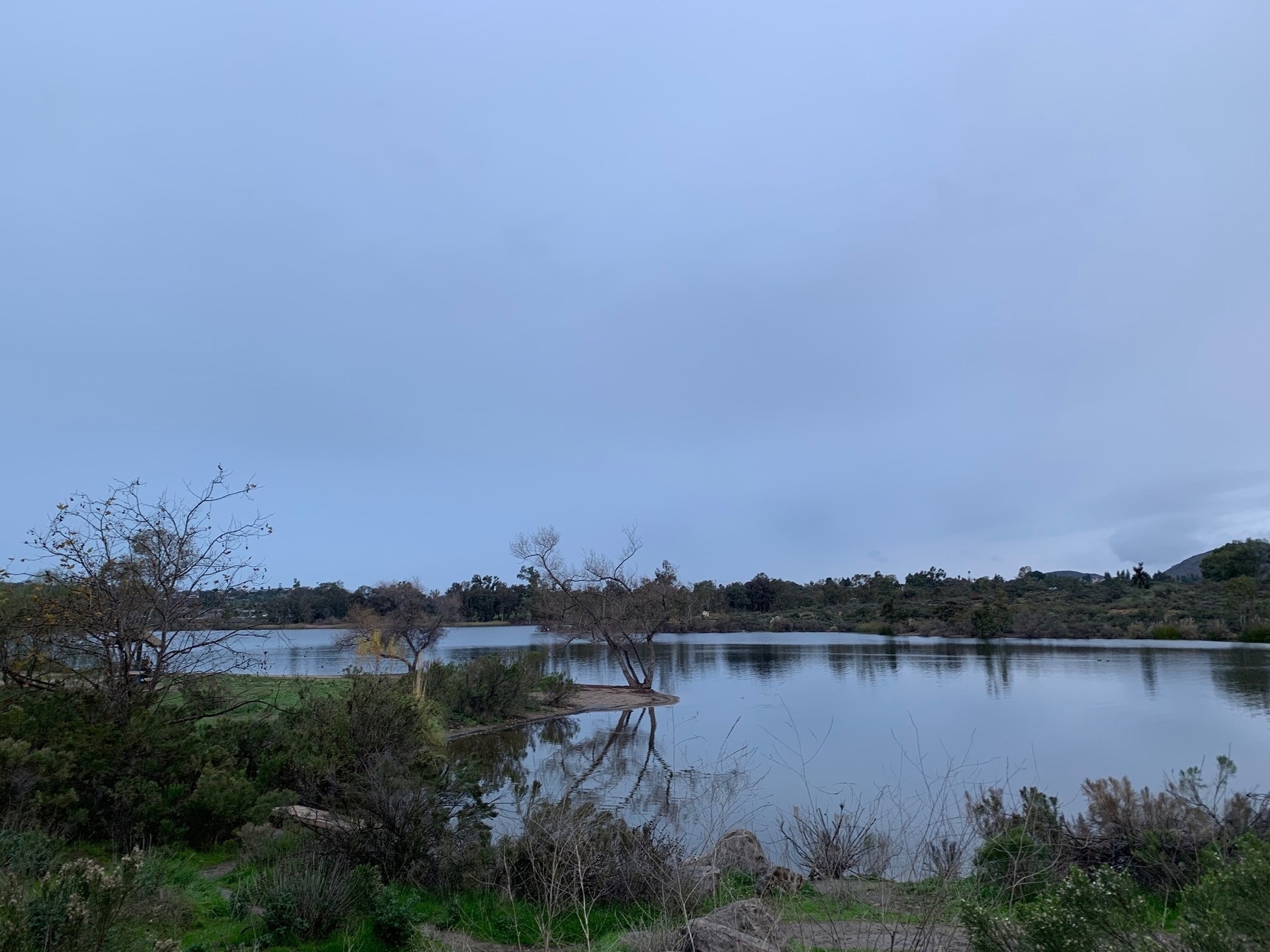
San Diego Union-Tribune: ‘It’s cold, wet, exhausting.’ Homeless people have few options when it rains.
San Diego homeless shelters are overwhelmed, leaving many people risking cold rain, flooding, and temperatures falling to the 40s. Staying dry is difficult—and essential to staying alive.
By Gary Warth.
Why the [expletive] can’t we travel back in time? [Ars Technica/Paul Sutter]
No known law of physics forbids time travel to the past.
Either time travel to the past is possible, or there’s some fundamental, basic physics we still don’t understand.
Either possibility is exciting.
“It’s obvious that the Universe is telling us something important… we just don’t know what it’s saying.”
I saw this dog at Lake Murray. He would like to say hello, and for you to admire his eyebrow.
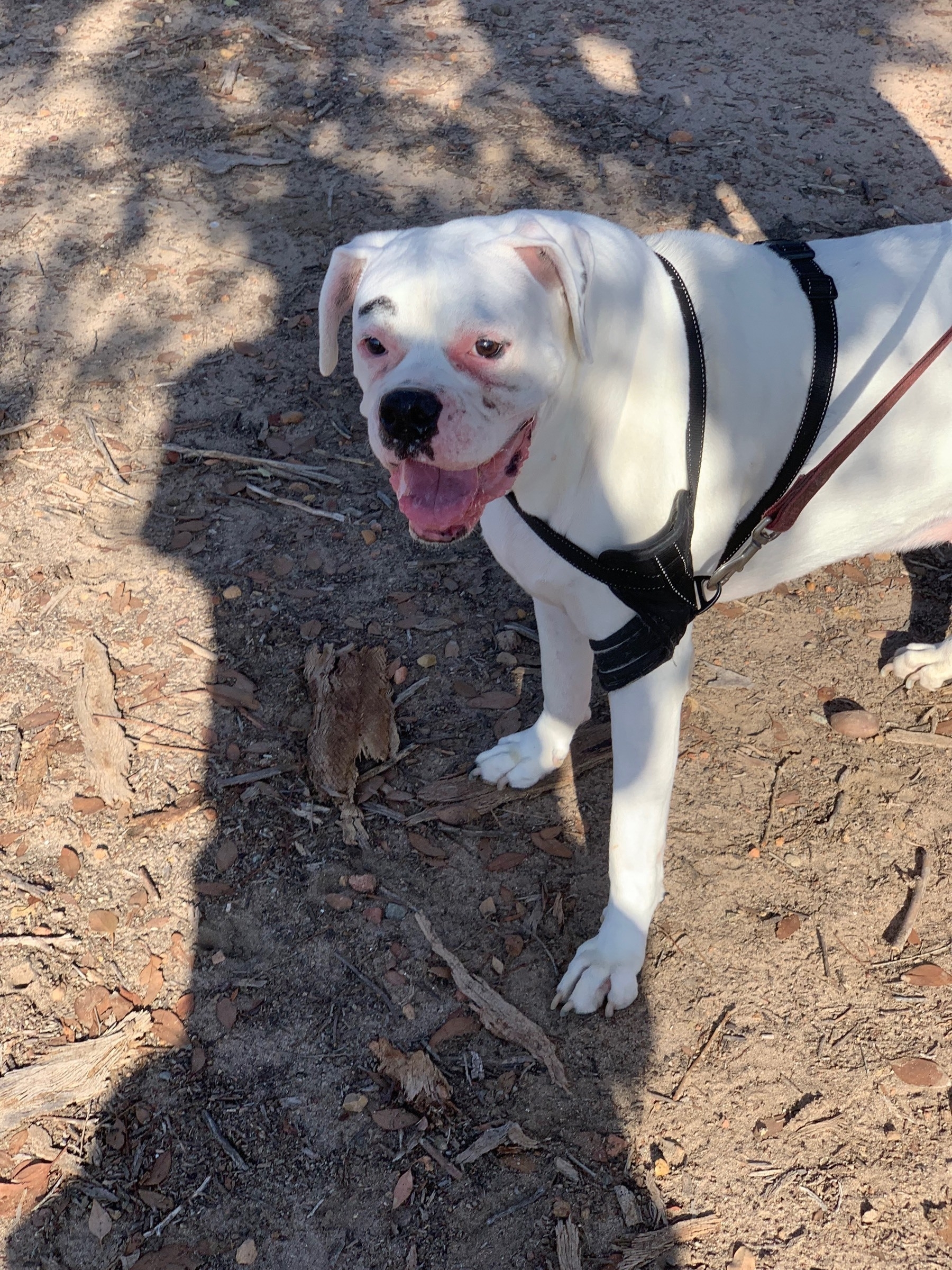
Coolio talked about ancient aliens, and making big investments in the metaverse and crypto, in an impromptu podcast interview before his death. [Billboard/Gil Kaufman]
The Coolio interview was bonkers—and poignant. The rapper said he expected he’d be long dead before climate change became a concern. Then he died a month later.
I expect climate change to be a concern long before I’m dead, and I’m only a year older than Coolio. It’s already a concern.
I’ve googled for more about the hidden continent occult belief that Coolio discusses. I haven’t found anything.
The podcast series, Crypto Island, was excellent. Sadly for the host/creator, PJ Vogt, most of the work on the series seems to have been done before the FTX debacle, so series is now obsolete.
The holiday break is over. It’s time to get back to work.

Apparently you can re-use 2017 calendars this year, which is funny to me because I have a 2017 calendar hanging up on the wall next to my bed. I stopped turning pages April of that year, and it’s been April, 2017 in the vicinity of my bed ever since.
The book Shift Happens tells the 150-year history of keyboards, from primitive typewriters to smartphones. Glenn Fleishmann @GlennF raved about this book on John Gruber’s @gruber@mastodon.social’s The Talk Show podcast—sounds interesting.
I saw this SUV while walking the dog. I feel better knowing we’re protected.
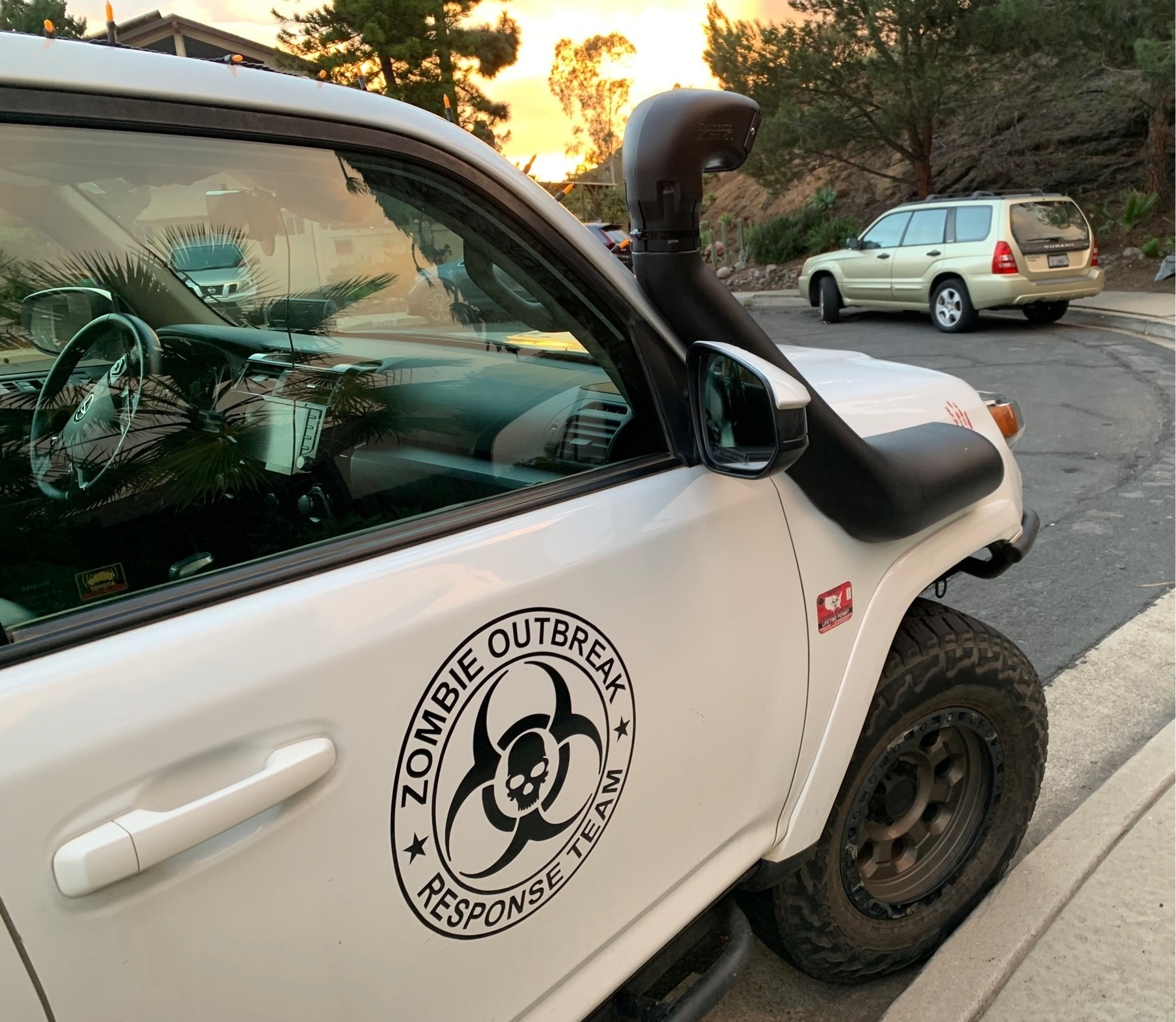
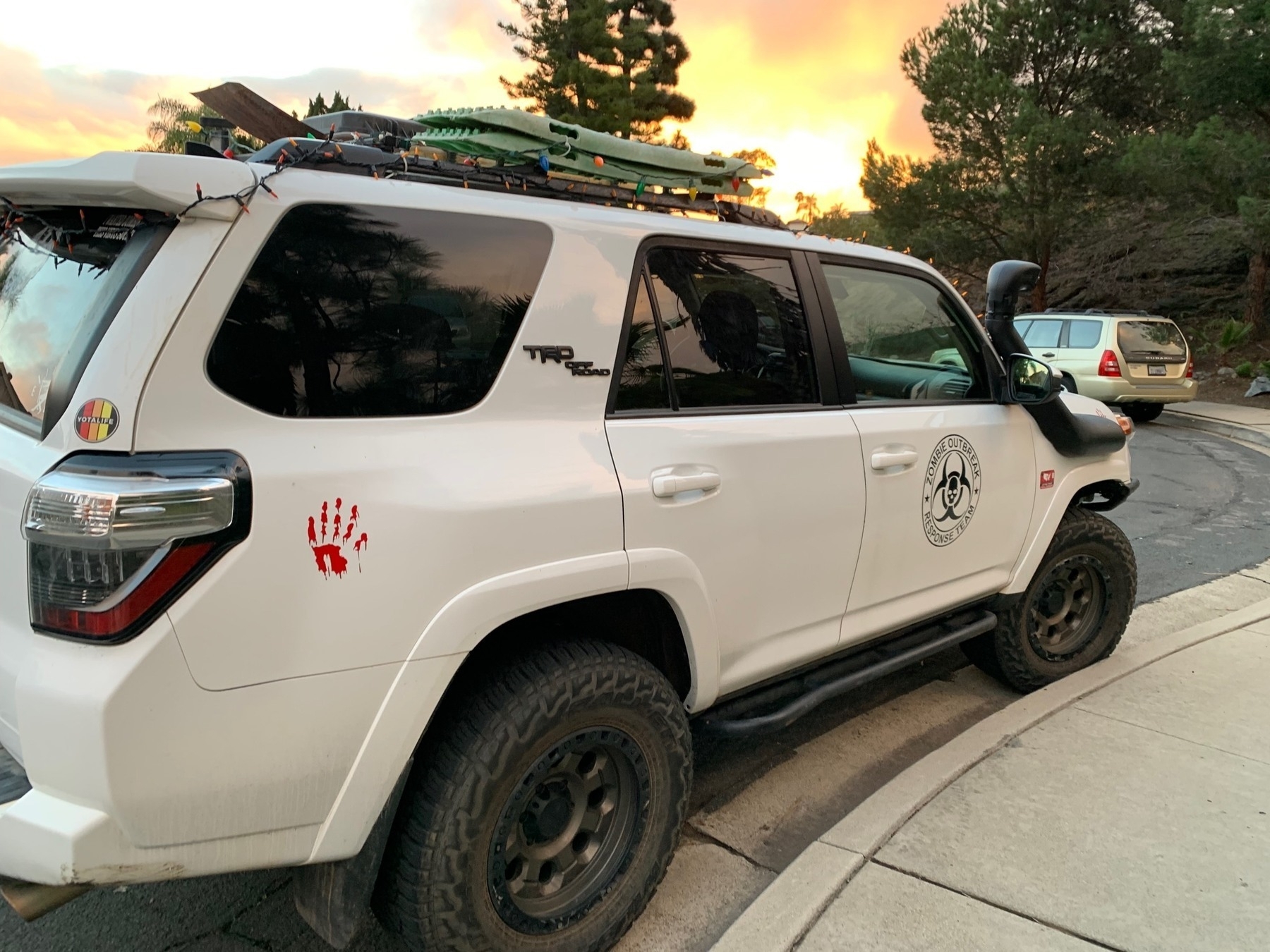
My car keys got hidden in a fold in the pocket of my rain jacket after I was done walking the dog this afternoon. I spent 15 minutes looking for them—on the ground, peering into the car window to see if I’d locked them in, patting my pockets over and over.
It was past dusk, so I was losing the light fast. I didn’t have a proper flashlight, just my phone. And it was raining. And I still had the dog with me, of course.
Also, as a middle aged man, I can’t go more than two hours without peeing, and I was past my limit.
And that’s Jan. 1. The year is going to get better, right?
I saw this house flying a Starfleet flag. I was tempted to ring the doorbell to express my approval.
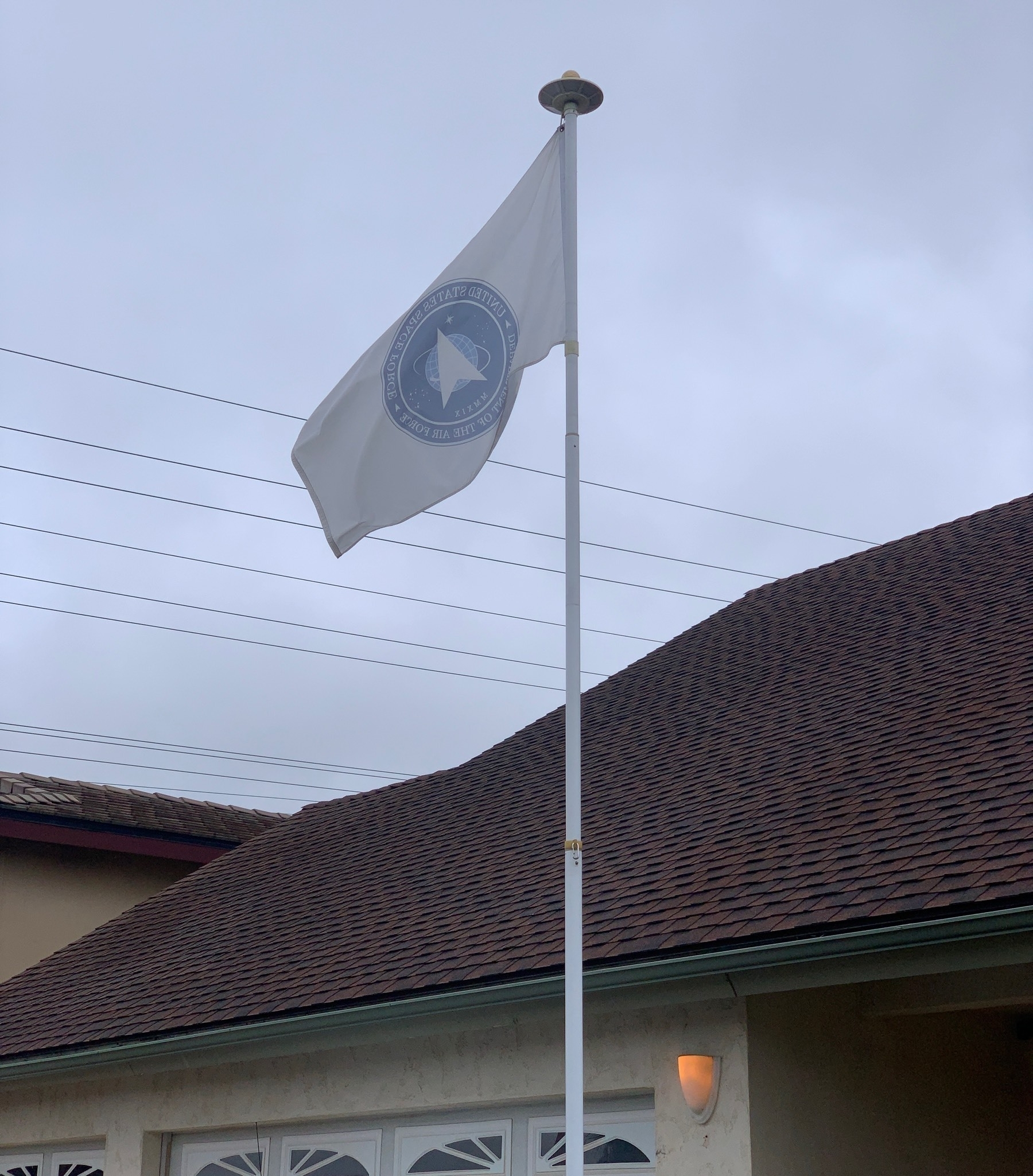
Portland Startup to Mine Artisanal Bitcoin Using Only Slide Rules and Graph Paper
“… powered 100 percent by avocado toast, ethically sourced kombucha and acai bowls.”
While walking the dog, I saw this tasteful Christmas decoration.

By the time New Year’s comes around, I have holiday exhaustion. New Year’s needs to be in March. Not a lot of holidays between January and May.
Quintessence is a “barebone Nuzzel clone” for Mastodon, in open beta.
It’s pretty simple: if you follow the @quintsns@mastodon.uno bot account, each day at 23:00UTC it will send you a direct message containing 10 links that have been shared in the past 24 hours by the people you follow, ordered by the number of different people you follow that have tooted/boosted the link.
Brilliant! I’ve signed up.
The exiled chief rabbi of Moscow says Jews should get out while they can. [The Guardian/Stephen Burgen]
Pinchas Goldschmidt says that, historically in Russia and the USSR, when things go bad, the government scapegoats Jews.
Jews have been fleeing Russia for a century. In 1926, there were 2.7 million Jews in the USSR, 59% of whom were in Ukraine. “Today only about 165,000 Jews remain in the Russian Federation out of a total population of 145 million.”
My own grandparents bugged out of Eastern Europe around 1900. Poland on my father’s side, Lithuania on my mother’s.
Also:
Ukraine has a long history of antisemitism from pogroms at the end of the 19th century to facilitating Nazi massacres during the second world war. The most notorious of these was the murder of 33,000 Jews at Babi Yar in Kyiv in 1941.
Given this history, Goldschmidt said it was remarkable that Volodymyr Zelenskiy, who made no secret of his Jewishness, was elected Ukraine’s president with more 70% of the vote.
That fact made a nonsense of Vladimir Putin’s claim that Ukraine was being governed by neo-Nazis, the rabbi said. “Show me another country that is in the grip of Nazis where the Jewish community is thriving.
“However, I don’t know how Jewish the president [Zelenskiy] feels. He plays the Jewish card to ask Israel for help.”
I imagine Zelensky’s Jewishness is much the same as my own. I am not observant, nor do I have a religious preference in my associations. But am I Jewish? Hell, yeah.
Goldschmidt also noted that while Russia’s Jews faced an uncertain future, antisemitism was on the rise in what had long been seen as a Jewish sanctuary, the US.
In 2018, a gunman killed 11 worshippers in a Pittsburgh synagogue. Last year the Anti-Defamation League recorded a record 2,717 antisemitic incidents in the US, ranging from assault and harassment to vandalism.
“For many years, Jews in the US believed that it was an exception, that whatever happened in Europe and other countries could never happen there,” Goldschmidt said. “But over the past three years there have been more attacks on Jews there than in Europe.
I have not been alarmed by the rise of anti-Semitism in the US. It still seems like a lunatic fringe. But perhaps I should be alarmed.
Julie and I saw this sign 11 years ago today.

Sign on the restroom door at Shakespeare Pub & Grille, San Diego, where we had Christmas dinner.

Musk’s Twitter cuts include a data center, janitors, and toilet paper [NYTimes/Kate Conger, Ryan Mac and Mike Isaac]
With people packed into more confined spaces, the smell of leftover takeout food and body odor has lingered on the floors, according to four current and former employees. Bathrooms have grown dirty, these people said. And because janitorial services have largely been ended, some workers have resorted to bringing their own rolls of toilet paper from home.
Cal Newport: On Quiet Quitting.
“Every generation reaches a point where they begin to think more critically about what role, exactly, work should play in their life.”
I’m still working on that. I’ve always been a late bloomer.
Ian Welsh: How To Relax, Change & Be Free.
“… everyone is acting according to conditioning: religious, social, family, school, philosophical, etc… They’re in chains, and they regard those chains as themselves.”
Ben Dreyfuss: Romanian Cops Did Not Find Andrew Tate Because Of His Greta Thunberg Video: “This is a lesson in media failure and misinformation.”
I saw a bulldog wearing a sweatshirt today.
This seems like a black-funny story until you read the charges against Tate. He”s not just your average MRA grifter. He seems like a monster and predator who should never breathe free air again.
Andrew Tate Arrested for Human Trafficking in Romania After Pizza Box Gave Away His Location. [Laura Bassett/Jezebel] “A video the men’s rights activist tweeted in response to Greta Thunberg’s burn about his small dick energy reportedly led authorities right to him.”
Four days after Elon bragged about unplugging an important server rack, Twitter went down hard. — Mike Masnick at Techdirt @mmasnick@mastodon.social
The woke mind virus strikes again!
“I remember reading an interview with a minister of an African state who said approximately, ‘every time a western minister visits us we get a lecture, every time a Chinese official visits we get a new hospital.’”
— Ian Welsh: A Map Showing The Two Main Geopolitical Blocs
Religious upbringing is great for kids, even for those of us who find ourselves nonbelievers, agnostics, or atheists. It helps a person figure out the world and cosmos and their place in it.
Talented trans woman writer Charlie Jane Anders @charliejane@wandering.shop remembers her time as a choirboy. She saw the best and worst of religion—“complicated and messy.”
Yesterday I read this post by Craig Mod about how he spends a big part of his day just walking around, unplugged, not connected to the Internet or listening to anything on earphones.
The Sorta Kinda Life Changing Bliss of Walking Solo
It made me think about how I seem to be looking at screens or listening to podcasts almost all the time1, and how maybe it would be better if I just … not.
In particular, I thought about how lately I’m listening to many podcasts out of habit, rather than real interest.
So I set aside a half-hour of my walk yesterday to just … walk. I took the AirPods out of my ears and listened to nothing but ambient sound and my own thoughts.
Do you set aside time in your day to unplug?
Or does your life naturally encourage unplugging? I imagine if you’re working with your hands in an activity requiring thought, you can’t be listening to audiobooks at the time.
Phrased that way, it seems shocking. ↩︎
Hello insomnia my old friend.
While walking the dog, I saw this splendid holiday display.

Crypto craziness craps out — and about time too. By Steven J. Vaughan-Nichols (@sjvn@mastodon.social) at The Register.
At a recent fintech open source fintech conference, crypto was only mentioned in passing. “People would talk about it in the same way you’d talk about your little brother’s latest embarrassing TikTok video.”
From where I sit, this is the slow but sure fall of what has always been one gigantic Ponzi scheme. There has never – never – been any real value in crypto. Yes, I know all the arguments about how fiat currencies have no intrinsic value either. You know what, though? If I go to the grocer, I can buy milk, bread, and butter with my fiat dollars or pounds. Dogecoin? Garlicoin? Trump NFT trading cards? I don’t think so.
…
At least with famous financial scams of the past, such as the Dutch Tulip Bubble and the 2008 real estate crash, you had tulip bulbs and houses for your money when all was said and done. With crypto, you’ll be left with nothing at all except meaningless, pointless, valueless blockchains.
I’ve been saying that bit about the tulip bubble for years. At least you had tulips.
The Sorta Kinda Life Changing Bliss of Walking Solo. By Craig Mod @craigmod@mastodon.social
Folks seem scared of solitude but solitude is a superpower when used well. Alone, in your basement, it breeds anomie, but out in the world, moving through the world, step after step, clear goal in mind, I’d argue that a solo walk during which you are engaged — paying attention, with your phone turned off, no headphones, no podcasts, no escape routes — is the quickest way to elevate a human. Basement solitude — isolated without serendipity, static, stagnant, stuck with your face in a screen, manipulated by the algorithms — is the death of the soul. The solo walk outdoors, in the air, beneath the sun, the rain, the snow, bumping into drunken horse betters, kind gardeners, farmers covered in blood, women beating mattresses at dusk, tractor trailer drivers leaning against their cabs for a smoke, is the opposite, the antipode, the physical palinode to basement solitude and the death of the mind and body.
I walk the dog more than three miles nearly every day, and that counts as walking alone. But I’m almost always listening to podcasts.
I sorta kinda remember who the author, Craig Mod, is—I think he’s a travel writer, currently living in Japan, and from this essay I gather his daily walks are part of his work. He seems to photograph and video the things and people he sees, and interviews the people, publishes the results on the web, some by subscription only, and sells it in books. Very different from my life (though it sounds appealing). He walks 12-45 km per day (that’s about 7.5-30 miles), carrying 12 kilos of photo and video equipment (26 pounds.
The walk, he says, is his work platform, the way the computer and Internet are mine.
Dogs start the day with a spoonful of Alpo or some other canned meat on top of a heap of patented, vitaminized kibble. In no time the meal is gobbled down and the dish licked clean and, like as not, poked noisily about the kitchen like a hockey puck, amid waggings. But I can recall another era, when every dog took a quick first look into his dish, to see what was in there. It was different each morning, but might contain a last chunk of pot roast or ham hock, plus gravy, from the previous night’s dinner table, a scraping of scrambled eggs, a slice or two of stale bread, leftover lima beans or spinach, a fresh but limp carrot, a splash of milk, and a half-bitten doughnut. It went down just as fast and probably did no harm, but what I’m getting at here is the old phrase “a dog’s breakfast,” because that’s what this book is. A mélange, a grab bag, a plate of hors d’oeuvres, a teenager’s closet, a bit of everything. A dog’s breakfast.
– Roger Angell, “This Old Man: All in Pieces.”
That’s what this blog is. A dog’s breakfast.
Texas Cop Sentenced To More Than 11 Years In Jail For Killing A Woman During A Welfare Check. By Tim Cushing at Techdirt.
Atatiana Jefferson was lawfully hanging around in her Texas home when she heard a prowler outside at 2 am, so she retrieved her lawfully owned gun to investigate. The prowler was police officer Aaron Dean, who was called on a welfare check after neighbors reported Jefferson’s front door was open and light was on at that unusual hour of the night. In the confusion that followed, Dean failed to identify himself as a police officer, and shot and killed Jefferson.
Dean made so many awful decisions in just a few minutes, as did the police department, which defended Dean as reacting to a “perceived threat”—that threat being Jefferson, who in reality was just being in her own home, babysitting her 8-year-old nephew, violating no law.
Amazon begins drone deliveries in California and Texas.
Residents of two towns, one in each state, can sign for drone delivery.
“The drone will fly to the designated delivery location, descend to the customer’s backyard, and hover at a safe height,” Amazon said. “It will then safely release the package and rise back up to altitude.”
Republicans Can Still Win in Blue San Diego. By Andrew Keatts at Voice of San Diego.
Mastodon has rejected five recent funding offers to preserve its nonprofit status. “Mastodon will not turn into everything you hate about Twitter,” says founder Eugen Rochko.
Remains to be seen whether this lasts. Money is a powerful temptation.
Seems like the super-efficiency that made Southwest a great airline in good conditions is making it a nightmare now. Super-efficient businesses have no slack in emergencies.
Daring Fireball: Southwest Airlines Has Fallen Apart
We saw that with some household supplies in 2020. And we’re still seeing it in healthcare today. Our healthcare system was designed to serve the healthier population of 2019 (and it served even them poorly, while increasing wealth for shareholders). US healthcare has been operating in emergency gear for almost three years now.
We saw this sobering sign and candle at the vet a few days ago.
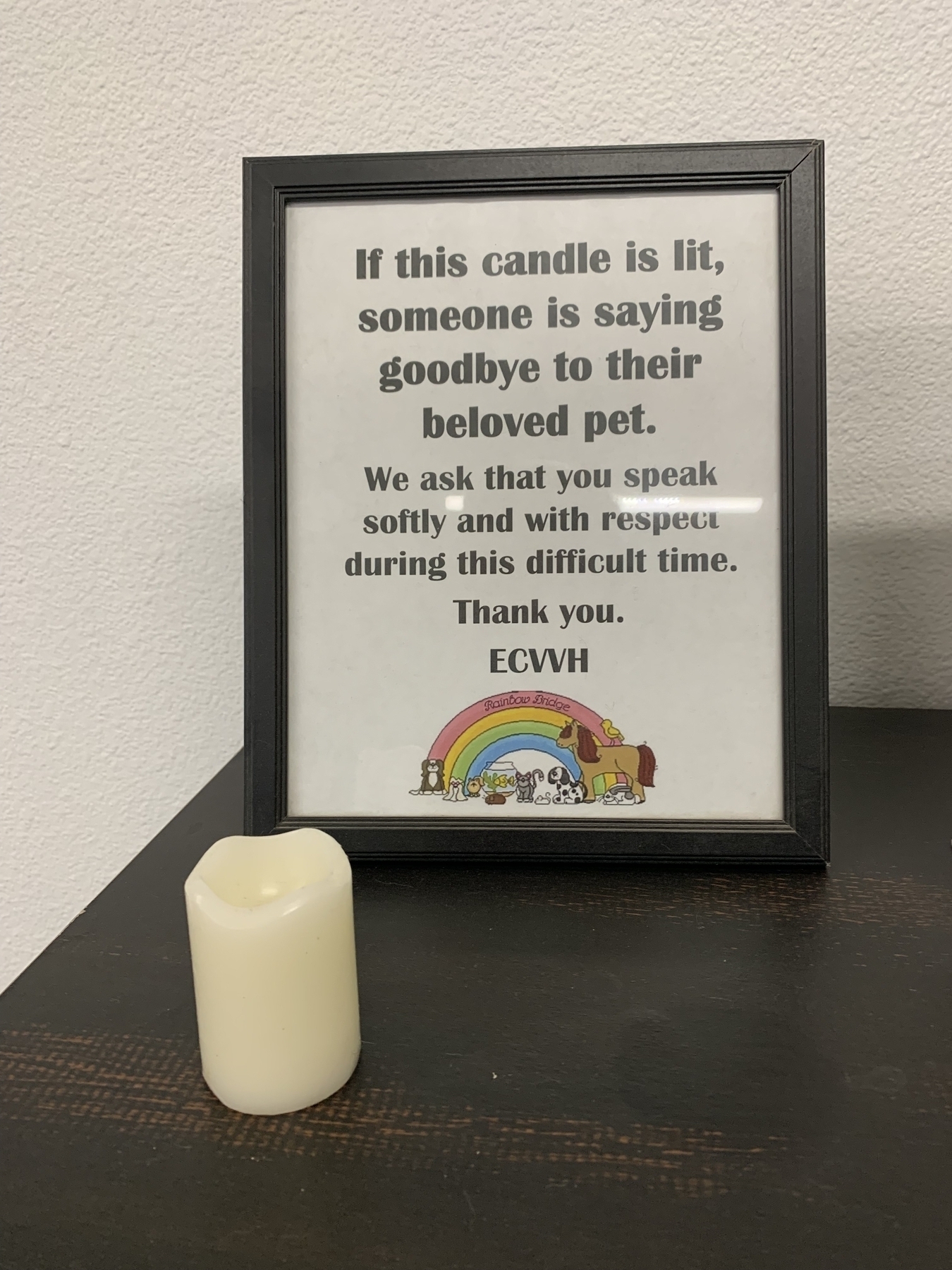
If you’re seeing this on Mastodon, I suggest you follow me at @mitchw@mastodon.social. If you think you’re already following me there, you’re actually probably not. I apologize for the inconvenience. Here’s an explanation.
A couple of days ago, I migrated all my followers on @mitchw@mastodon.social to @MitchW@mitchw.blog. “It’ll be great!” I said to myself. “Finally, I won’t have to cut-and-paste to multiple social media platforms to participate in all of them! Write once, read anywhere! Yippee!1”
Here’s what I soon learned:
A. Formatting: When viewed on Mastodon, micro.blog truncates posts at 280 characters, rather than Mastodon’s standard 500. Also, micro.blog strips paragraph breaks from posts sent to Mastodon.
B. micro.blog doesn’t support boosts.
Once you’ve migrated followers from Mastodon to micro.blog, there’s no automatic way to send them back.
Once you’ve migrated followers from a mastodon account, that account is deactivated. I had a vague idea that I’d continue using my Mastodon account to read, boost, and reply, but that won’t work.
I expect 1.A will be corrected soon—management is On It, fixing formatting problems. Until then, I expect I’ll just manually cut-and-paste posts to micro.blog and Mastodon. Once the formatting problems are fixed, I’ll see if I can reactivate micro.blog’s otherwise excellent tool for automatically cross-posting to Mastodon.
However, I expect 1.B will never change. Boosts are antithetical to micro.blog culture. I’m ok with that.
In the long run, I’d like to see better integration between Mastodon and other services, to help folks like me maintain a presence in two or more places at once. I don’t have a clear vision of what that would look like. Maybe a micro.blog Mastodon instance that somehow syncs with micro.blog itself?
I did not actually say “Yippee!” ↩︎
San Diego needs to build housing and plenty of it. Forget “neighborhood character” and the environment. Current conditions are a crime against humanity.
STUT: These are the stories of newly homeless San Diegans. By Gary Warth.
When Britain abolished slavery, slaveowners received compensation. But what about the enslaved people themselves? Did they get any financial reparations for the terrible crime committed against them by the slaveowners and society?
7 Reasons Why Britain Abolished Slavery. By Luke Tomes at historyhit.
How a Town Famous for Xenophobia Fell in Love With Immigrants
“We now want as many immigrants as possible,” said Bernard Thompson, the mayor of Hérouxville, Quebec, a onetime supporter of the town’s anti-immigrant code.
The Central African Republic, one of the world’s poorest countries, became one of only two nations in the world to adopt Bitcoin as a cryptocurrency. Eight months later, almost nothing has changed.
Crypto was an alternative to the CFA franc, which gives France effective control of the economies of more than 180 million people in its former colonies.
Critics say the Bitcoin transition was a gimmick to hype up interest in CAR’s own cryptocurrency, which failed.
One of the World’s Poorest Countries Put Its Faith in Crypto – Why?. By Ben Hunte at Vice World News.
My favorite part of George Santos’ self-defense is where he says he never claimed to be Jewish, he just said he was “Jew-ish.” Oy.
Jackie Hoffman steals “Glass Onion.”
Elon Musk was never a liberal, and his plans for Twitter were never benevolent. “Tech barons’ lip-service to democracy and pluralism was always conditional on preserving their own positions at the top.” By Thomas Zimmer at The Guardian.